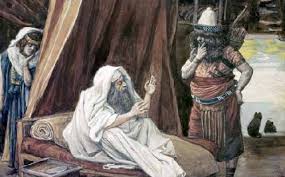Prepare Me the Kind of Tasty Food I Like
and Bring It to Me so that I May Give You My Blessing
27: 1-4
Prepare me the kind of tasty food I like and bring it to me so that I may give you my blessing DIG: What did Isaac know about God’s will concerning the son of promise? What was Isaac’s intent? Why didn’t Esau object if he had already sold his birthright to Jacob? Why didn’t Isaac tell Rebekah?
REFLECT: How effective is the father’s spiritual leadership in your family? Are you and your spouse on the same page? What can happen when you favor one child over another? What happens when we deliberately go against God’s will, as Isaac was apparently prepared to do?
There is one more area in which the sovereignty of God can be seen in this parashah. This is in the area of passing the blessing and the inheritance from Isaac to Jacob. There is, perhaps no greater contrast between the sovereignty of God and human dealings than in this part of the narrative. It is so easy to get stuck in the mire of the human mess we see here that it is easy to miss the workings of the Eternal One. Let us see if we can catch sight of the sovereign hand of ADONAI.
We have seen that Isaac was an outstanding man, a great man. Abimelech and the Philistines came to make a treaty with him because they feared him (26:26-33). He was a peace loving man, and he was also very powerful. However, Isaac was still human and here he reveals his weakness of the flesh. Esau had always been his favorite son, while Jacob had been the favorite of Rebekah. Esav was a mighty hunter who would go out and bring home venison and cook it just the way Isaac liked it. Now that Isaac (Hebrew: Yitz’chak) was very old he thought it was time to bless his favorite son. It was perfectly clear that he knew of the purposes of ADONAI concerning his younger son (25:3b), but his heart overruled his conscience. So he told Esav to go out and quickly bring back some wild game and he would give him the patriarchal blessing.432
Finally, we get to the end of Isaac’s life. He is on his deathbed. And, as customary before one dies, he is about to dispense appropriate blessings, which are really prophecies. This is what Jacob will do before he dies, and what Moshe will do before he dies. When Isaac was about one hundred and thirty five years old and his eyes were so weak that he could no longer see, he called Esau, his older son. Rather than call both his sons to receive the blessing as was customary, he summoned only his favorite son and said to him, “My son.” Esav answered: Here I am (27:1).433
Yitz’chak reminisced: I am now an old man and don’t know the day of my death (27:2). His half brother Ishmael had died fourteen years earlier, and they were fourteen years apart. Therefore, he probably thought that his day of death was close. However, he lived until he was a hundred and eighty, so he wasn’t as close to death as he assumed. If Isaac’s eyesight was failing, his appetite was not. He said: Now then, get your weapons, your quiver and bow, and go out to the open country to hunt some wild game for me (27:3). Esau was quite willing to go along with his father’s suggestion. It was expected to mark the giving of the patriarchal blessing with some kind of a feast. And since Yitz’chak had decided to bless Esau, it seemed appropriate that Esau’s hunting ability would provide the meat for the celebration.

Therefore, Isaac said: Prepare me the kind of tasty food I like and bring it to me to eat so that I may give you my patriarchal blessing before I die (27:4). This was in clear violation of the revelation given to Rebekah (to see link click Gm – Two Nations, One Womb). There, ADONAI revealed that Jacob was the son of promise who would carry on the line – not Esau. After all, hadn’t Esau married two Canaanite women? Isaac most likely knew that Esav had already sold his birthright to Jacob, and whoever had the birthright was supposed to get the patriarchal blessing. Perhaps he was so angry at what he perceived to be Jacob’s deception that he just decided to bless his favorite son, and ignore God’s plan. But it seems that Isaac’s eyes were weak spiritually as well as physically. He did not have his Father’s eyes.
It is significant that Yitz’chak was not doing this with Rebekah’s knowledge. Which meant that he knew he was doing something against the wishes of the wife and God. She only happened to overhear the conversation. This secretive nature of Isaac’s plans can only be explained by the assumption that he was ashamed of what he was doing, knowing that Rebekah would not approve, but hoping that he would get it accomplished before she could interfere.434 His sin set in motion a catastrophic series of events that would affect the entire family.



Leave A Comment